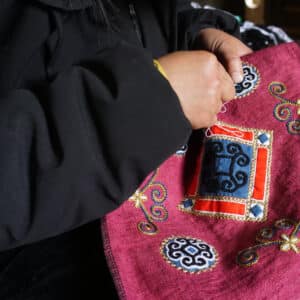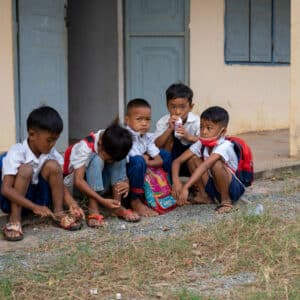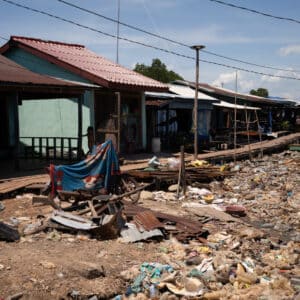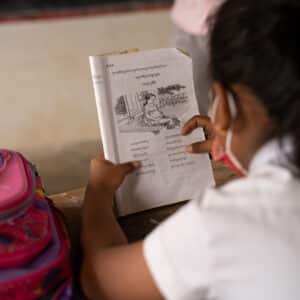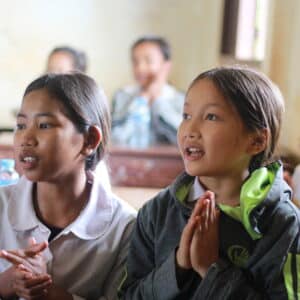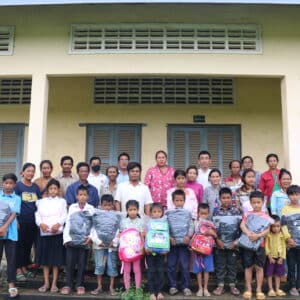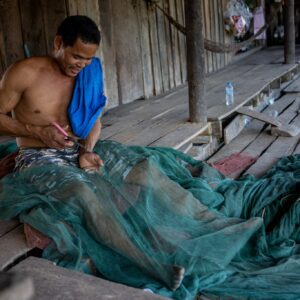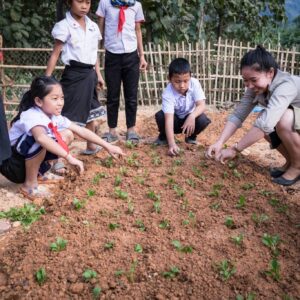The construction of sanitary toilets and handwashing facilities in primary schools in Vietnam’s Hoa Binh province are supporting students like Mai Hoa with better hygiene habits, and a better chance of staying healthy and in school.
Among the many ethnic minority groups living in the lush, green, mountainous province of Hoa Binh, in northwest Vietnam, is ten-year-old student Mai Hoa. While Hoa Binh has grown in popularity as a tourist destination in recent years for its scenic landscapes, it’s rural location has presented many challenges to its inhabitants, including Mai, particularly in terms of access to water, health and sanitation facilities.
In Sơn Phú village, where Mai lives, the lack of paved roads surrounding the primary school led to the school’s outdoor toilet getting extremely muddy during monsoon season and left the children without access to proper water and sanitation facilities. Inadequate access to water, sanitation and hygiene (WASH) like this remains a major problem for many children in rural Vietnam, according to UNICEF.
While Vietnam has attained significant progress with respect to improving rural water sanitation and hygiene over the last decade, progress in sanitation and hygiene remains slow with disparities based on geographical location, ethnicity and social status. According to research from 2018, disparities across ethnic groups are discernible with 26.8 per cent of ethnic minority groups defecating in the open against 2.4 per cent amongst the Kinh/Hoa ethnic majority households.
Lường Thị Cảnh, a mother of two and resident of Sơn Phú village says that without a toilet at home, her family have no choice but to defecate in the garden. Her husband is currently recovering from a brain hematoma and his health issues means he cannot work as much as before. “We do not have a toilet because there is no money to build one,” explains Thị Cản.My husband and I try to save money but it is just enough money to build a house, the whole family has to do those things [defecate] in the garden.”
Without access to toilets at home, for some children, schools offer their only access to a sanitary toilet. However, when schools also don’t have adequate sanitation facilities either, this can contribute to poor learning outcomes, absence from school, and increased risk of diarrhoeal diseases – which is one of the top ten greatest causes of death globally according to The University of Oxford, and accounts for 12% of the deaths of children under five in Vietnam.
“If there is no toilet, there will be no place to go to the toilet. It will affect the environment with the bad smell, and it also affects our health,” explains Mai.
While Mai’s teacher Nguyễn Thị Thanh Phương agrees with her student’s point of view, she also stresses that schools need more than one hygienic toilet. “As the school is crowded with students, the toilets are often clogged due to overload,” she explains.
Adequate handwashing facilities are also essential attests Phương who always reminds her students that washing their hands with soap and water is one of the most effective ways to prevent illnesses and the spread of infections.
“Without a handwashing area, our hands will be dirty when playing, then eating with dirty hands will cause stomachache, the dirty hands writing will also make books dirty, bacteria will easily spread, especially Covid-19,” says Mai, when asked why having sinks at school matter.

In 2020, Aide et Action supported the construction of 2 toilets and 5 handwashing stations in Mai’s school, supporting 523 primary school students and 65 teachers with improved access to water, hygiene and sanitation facilities. The new toilets and handwashing stations were a turning point for most of the children leading to the development of hygienic new habits to better protect their healt since then.
“Now that there is a hand washing area, we were taught how to wash our hands by the teachers. There are also signs on the wall with instructions on how to wash hands. We also pay attention to washing our hands properly according to the instructions.”
Mai loves going to school where she can meet her friends and study her favourite subject, art. One day, she dreams of becoming a doctor so she can dedicate her life to looking after others. Hopefully, with access to quality education and better water, health and sanitation facilities, Mai can stay in school and follow her dream.




